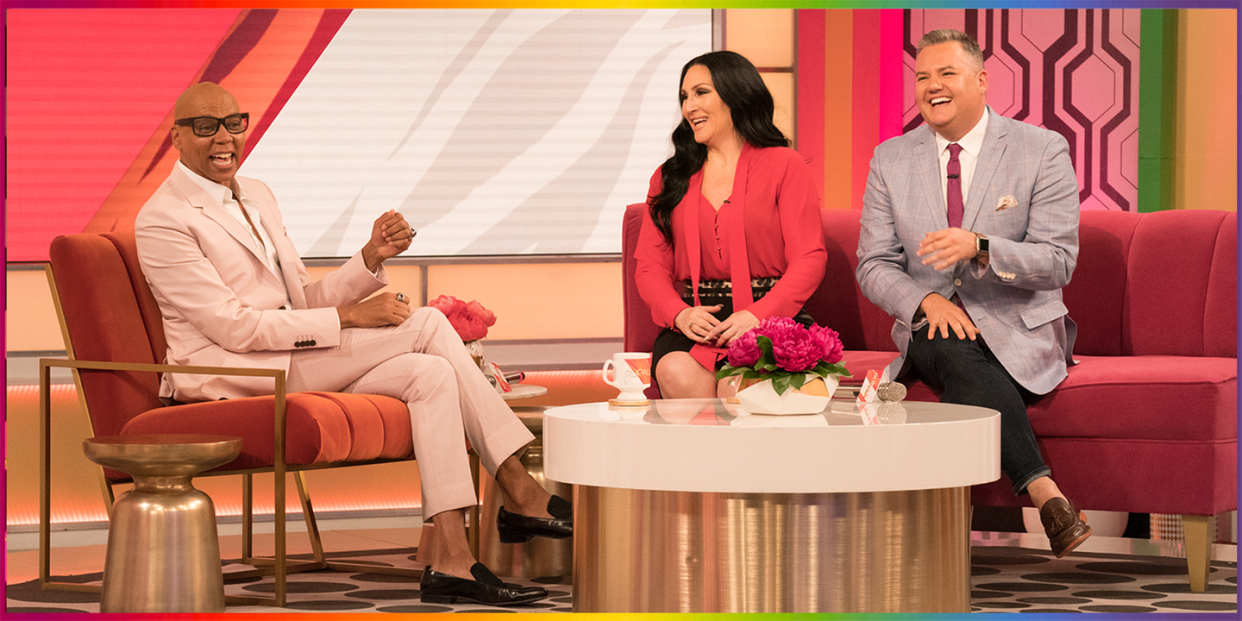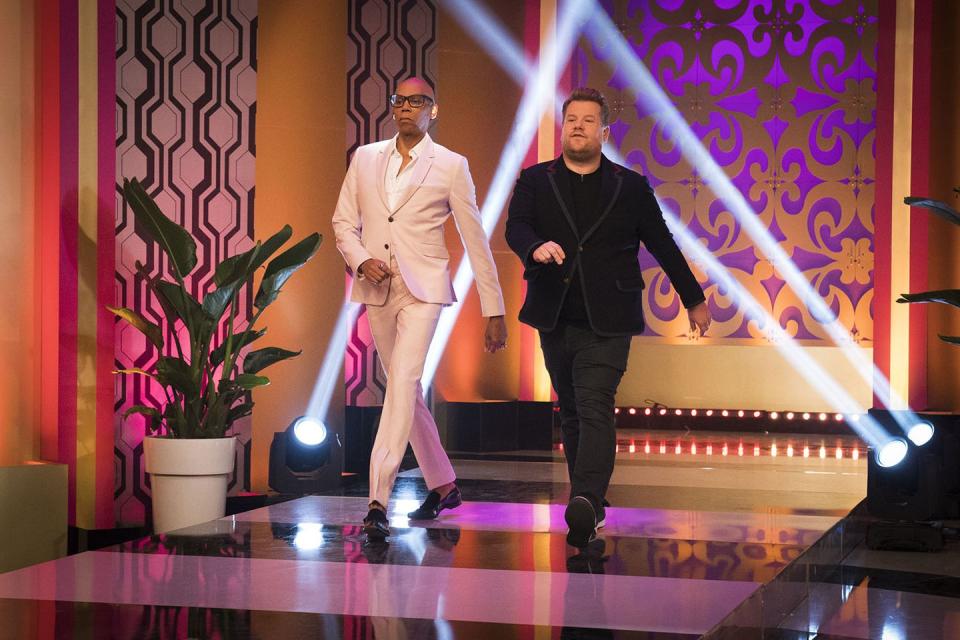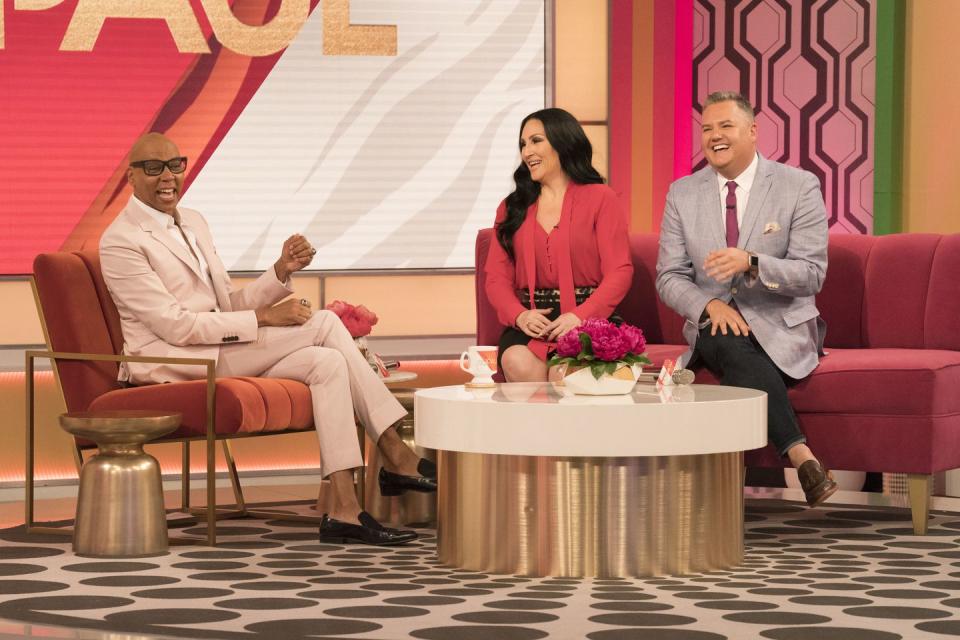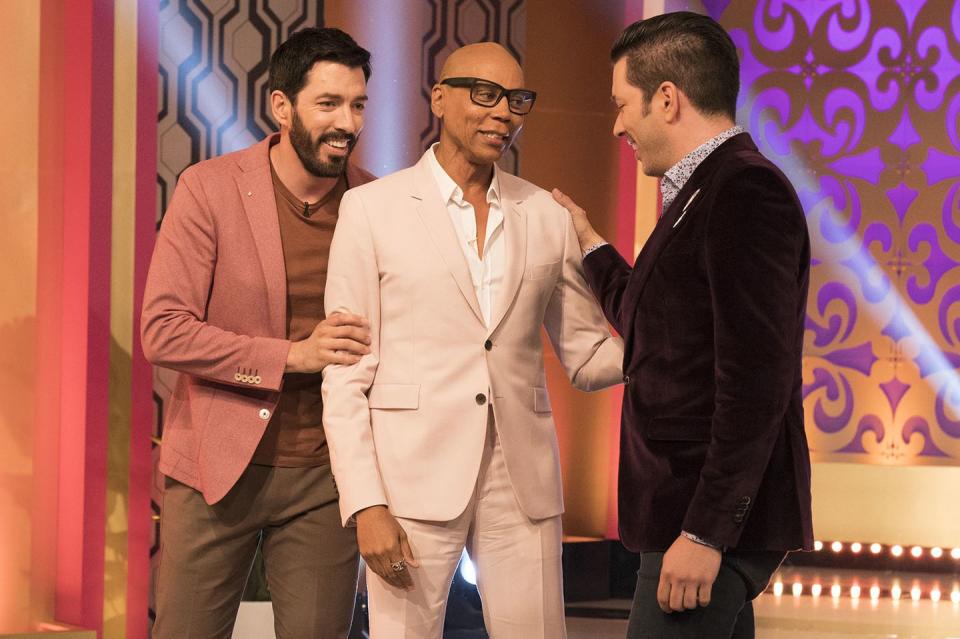RuPaul's New Talk Show Is as Soulful as The Oprah Winfrey Show—but Gayer

At OprahMag.com, we encourage our readers to authentically be themselves. So we’re commemorating Pride Month and the 50th anniversary of the Stonewall riots with Loud and Proud, a selection of voices and stories that highlight the beauty-and ongoing struggles-of the LGBTQ community. Here’s to celebrating every color of the rainbow.
Prediction: Everyone will soon be talking about RuPaul’s shiny new self-titled talk show, which marks his official return to daytime television.
Last month in Los Angeles, I had the opportunity to watch the longtime RuPaul’s Drag Race host, actor, author, activist, and performer find his groove during a live-taping of the Fox Televisions Stations show. (It's set to air at various times from coast to coast, so check local listings to learn how to watch after the June 10 premiere). Throughout the day, RuPaul-who is a natural on stage-had me laughing out loud, sharing meme-able videos on my Instagram Stories, and, twice, bursting into tears. Like, full on Oprah-style ugly cry.
Moments after filming an episode with Adam Lambert, a recently engaged gay couple, and Sara Cunningham-founder of Free Mom Hugs-RuPaul changed into a comfortable set of sweats to sit down with me and discuss the show, during which he interviews celebrities like James Corden and Senator Cory Booker. “I want to fall in love with the person I’m interviewing,” he tells OprahMag.com. “I’m curious about people, and what makes them tick, what motivates them, and what they’ve done to navigate this life, which is hard. Life is hard, it really is.”
That may be true, but RuPaul knows exactly how to use life’s difficulties to help viewers find joy in the little things.
While by now daytime talk shows all follow similar formats (there are live celebrity interviews mixed with luxurious giveaways and political debates), RuPaul’s manages to be different. Each episode kicks off as audience members sashay down the runway for the opportunity to get selected as his “slay of the day.”
A post shared by RuPaul Show (@rupaulshow) on Jun 8, 2019 at 1:09pm PDT
After a super-fun (and super-gay) intro, the “Supermodel (You Better Work)” singer gets down to business, keeping all of his interview subjects seated next to him throughout the entire 60-minute episode, a choice that makes for rich, diverse conversation between guests. Topics can get heavy (think: coming out stories), so viewers will want to keep a box of Kleenex handy.
If that weren't enough, the roster of interviewees for his first season includes Corden, Booker, Property Brothers hosts Jonathan and Drew Scott, Paula Abdul, Adam Rippon, Jack Osbourne, Loni Love, plus Miss Teen USA 2019 Kaliegh Garris, Miss USA 2019 Cheslie Kryst, and Miss America 2019 Nia Franklin-and that's just during week one.
On set, two rows of fans from a live audience sit on the stage, making for a warm living room atmosphere, with décor signage that reads, “Everybody say love!” Nearby, RuPaul’s longtime friend Michelle Visage and another frequent Drag Race judge, Ross Matthews, sit to offer over-the-top comments and reactions to his interviews.
To cap off each episode, Visage and Matthews join RuPaul and the celebrity guest in a funny new Jeopardy-style game called, “Name! That! Queen!” It’s silly and light, deep and emotional at the same time; the show manages to provide precisely what feels missing right now in pop culture: pure, happy television for adults.
In sum, it's special.
By the way, RuPaul hosts the show dressed in his signature colorful suits, not dressed in drag. “Many of you know me like this,” he says during the premiere episode, pointing to images of his drag. “But starting today, I want you to know me like this.”
Fans of all things Drag Race will be pleased to know similar Ru-isms heard on the competition show are repeated here. Among them? If you can’t love yourself, how the hell you gonna love somebody else. Can I get an amen?
RuPaul’s executive producer Jill Van Lokeren-who previously worked on The Oprah Winfrey Show and, most recently, Michelle Obama’s Becoming book tour-thinks this will be a game-changer. “He has the ability to shift how people see themselves, see each other, see their neighbor, see a stranger, and there’s no better time for that kind of message in the universe,” Van Lokeren tells OprahMag.com. “Michelle Obama just signed a copy of her book for him on tour, and she wrote to him, ‘You are the voice for the voiceless.’”

That voice premieres on Monday, June 10 on select Fox Stations-check your local provider in New York, L.A., San Francisco, Houston, Phoenix, Minneapolis, and Charlotte. As RuPaul reminded audiences during the taping, the show is airing for a three-week “test run,” so now’s the time to let it be known that you love it-and want it to return.
I caught up with RuPaul to discuss his latest venture and how he manages to keep his head held high when the going gets tough.
In 1996, you famously hosted The RuPaul Show, a VH1 talk show with Michelle Visage. Did you imagine you’d be doing the same all these years later?
Well, I was hoping it would come up again. I have been practicing having a talk show since I was five years old. I watched Mike Douglas, and Merv [Griffin], and Johnny [Carson], and Dinah [Shore], and every other talk show that came and went. I love the concept of people taking their mask off and telling the stories of how these super talented entertainment giants get through every day and navigate their lives. I love that. Them being so candid and truthful, it’s so helpful to all of us because we assume everyone has the instruction book-it looks like everyone is doing just fine-but when they share their experiences, strength and hope and failures, it humanizes them. You fall in love with them, and you find strength in their stories.
Your interviews really go there-and I’m sure they fill your soul. What do you do with the personal information interview subjects share?

If you wake up and think, today’s a rough day, what do you do?
I do have a spiritual practice. The first thing I do when I wake up is I stretch, then I pray, since I’m already down there, and then I will meditate. And that balances me and gives me a starting point that feels solid.
Your new show has me thinking of Ricki Lake, Maury, and, of course, The Oprah Winfrey Show. How did classic talk shows influence you?
I love talk shows, I love television. And I am a result of every experience I’ve ever had. And all those experiences watching television shows as a child, as an adult, they’re here, and so I’ll use whatever works. That’s what I think is so brilliant about talk shows, is that it’s really a forum for us to see ourselves.
I tell this story about Clash of the Titans, where the guy-I think it’s Jason or somebody-he has to go and cut off the head of Medusa, but they tell him, "If you look at Medusa in the eye, you’ll turn to stone." So, he realizes that his shield is reflective, and that’s how he’s able to cut Medusa’s head off, because he looks into the shield, which is reflective, and navigates it. Well, I see other people as my shield, as my reflector, so I can see myself in other people, especially if they’re being brutally honest and completely vulnerable. And it’s in those moments that I can fall in love with them and fall in love with myself.
You’re very self-reflective. Were you always that way?

I was. You know, my parents were crazy country people, and us kids, we had to be the adults, and we had to be rational and we had to look after ourselves. My sisters, who are seven years older than me (they’re twins), they were very nurturing to me, more than my mother could. My mother had a hard time.
I have compassion for people, and I had compassion for my mother, and so that relationship prepared me to deal with people who may be unstable. Or people who aren’t very sensitive, or overly sensitive. I think I’ve always been able to see myself in other people. And even in TV shows where they prank people who don’t know they’re being pranked-I don’t like seeing it. Because something in me feels that it’s cruel. And so, we naturally all have that, if someone trips on the rug, we all go, “Oh, oh, here let me get you!” And that’s a natural instinct. I’ve always been very aware of it.
LGBTQ representation isn’t perfect, but it's improving. How do you feel about the portrayal of queer people in entertainment since your first talk show premiered in 1996?
Well, that’s a lot of history, what you’re talking about. I think we’re in a really optimistic place now. I think people are willing to talk about it, people know that talking about their experiences does help other people-helps them. And so, this is a real golden age. Now, it’s also a very dark time, literally and figuratively, it’s a dark time. So we’ve come a long way, and there’s a long way to go.
For more ways to live your best life plus all things Oprah, sign up for our newsletter!

